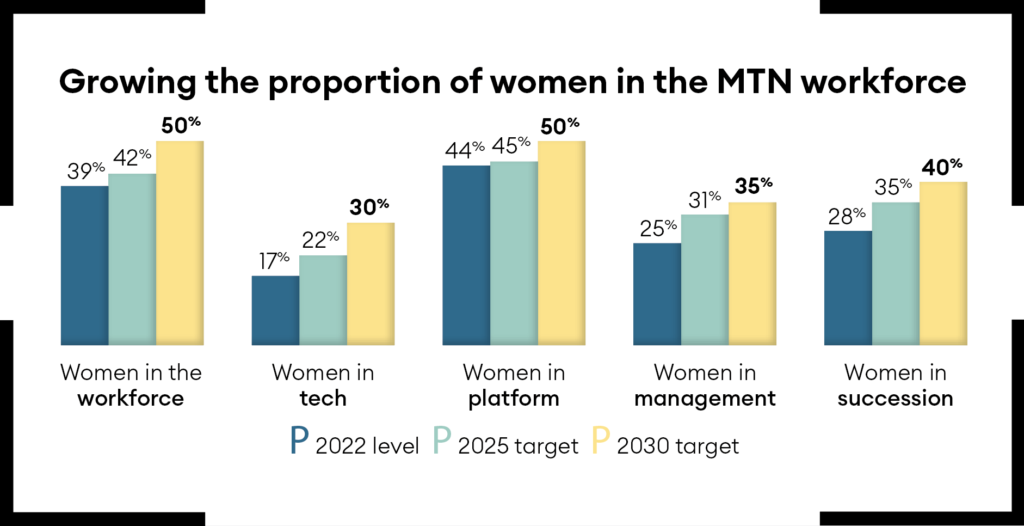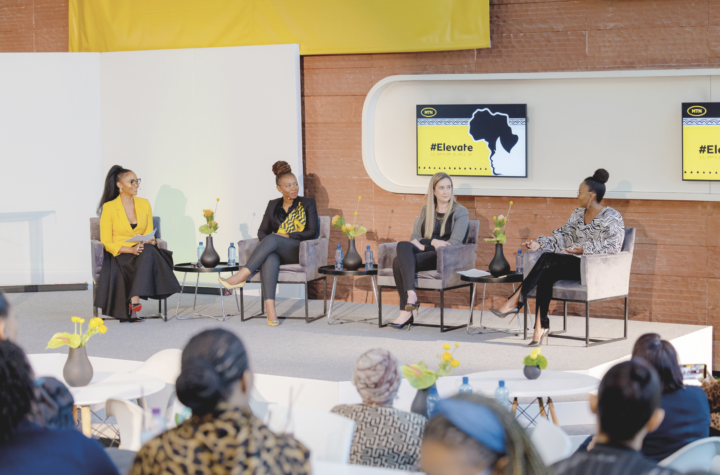Paul Norman explains how MTN has embedded its approach to creating diversity and inclusion for women
MTN Group was established in 1994, at the dawn of South Africa’s democracy. Today, we serve over 270 million customers with products and services across consumer, enterprise, fintech, wholesale and digital services, through a 19,000-plus workforce that represents over 70 nationalities, multiple ethnicities and languages, and four generations – with 50% being Millennials or younger. This makes us not just one of the largest, but among the most diverse homegrown African companies.
MTN has been organically strong on diversity throughout its history, but the major pivot was in recognizing that diversity and inclusion is a journey. Continuing to make progress requires intentional, mindful action to foster a sense of belonging among our people, customers, business partners, communities and stakeholders. Our mindful journey began in 2019 with us framing a deliberate vision, philosophy and commitment to diversity and inclusion. That vision is to be the most inclusive and successful organization across Africa and the Middle East, putting diversity into action to help employees, customers and communities thrive. It is inextricably linked to our inclusive purpose: the strong belief that everyone deserves the benefits of a modern connected life.
To deliver on diversity and inclusion, we are driven by our guiding principles and a framework based on demonstrated leadership, contextual recognition of diversity, and conscientious action. Accountability is our north star, so it was imperative to identify outcomes that make an impact for those we serve, assessed via measurable goals and actionable performance targets.
Embedding responsibility
To embed accountability for diversity and inclusion, it was vital for us to institutionalize and embed a leader-led approach.
Responsibilities are shared by senior personnel. The agenda is ultimately owned and led by the group president and chief executive, while the group chief HR officer is the custodian of the diversity and inclusion agenda, responsible for developing, executing and reporting on strategies relating to people and culture. The group chief sustainability and corporate affairs officer is responsible for sustainable community impact. Our boards and their sub-committees serve as oversight bodies, keeping us accountable. As a whole, our leadership – comprising CEOs and C-suite executives – are critical stakeholders for the diversity and inclusion agenda. They are held equally responsible for creating on-ground impact, as measured by our performance goals and targets.
Since 2019, our strategy for diversity and inclusion has matured to be deliberate, targeted and mission-oriented. Through it, we seek to continuously understand, recognize and transform our ecosystem. Women have played an immeasurable and equal part in building MTN over the last 28 years. On boards and executive committees, among core business leaders and in our workforce at large, MTN has been steered by strong, bold and fearless women who continue to shape our story. Our commitment to gender equality comes from recognizing that MTN’s purpose, identity, culture and progress will only be realized with a work environment that is equitable. In line with this, our new strategy, Ambition 2025, squarely places ESG and its imperatives at the core of our priorities. Today, women constitute 39% of MTN’s workforce across our markets. We are committed to growing that share, becoming gender equal by 2030. But the true value of equality is in creating greater equity for women in our workforce. To this end, we are targeting several equity drivers. All are supported by measurable targets, performance goals and transparency mandates to measure achievements and ‘work-on’ areas of improvement.
Target-based goals to increase women in leadership, succession and in critical roles
These include near-, medium- and long-term commitments to align with our overarching agenda for gender equality and equity. Targets are defined for specific employee groups, such as women in tech and management roles (see graphic below).

Linking ESG-led performance and rewards to the diversity and inclusion agenda Inclusion targets are part of our incentive framework, relating to both short-term and long-term incentives. It is a hallmark of our leadership-led accountable approach. For example, executive leadership across markets have a long-term incentive target (to achieve 50% women in the workforce by 2030). Each operating company then has specific nearer-term targets based on the current representation of women. A short-term target, applicable to group executive members and market chief executives, is to foster and improve our inclusive culture, based on employee sentiment as measured by our regular surveys.
Specialized programme for women to enhance future leadership pipeline
Rising Leaders, our marquee programme aimed at women in mid- and senior-management roles, aims to build our internal pipeline of women leaders.
Mandatory targets for the inclusion of women in critical skills and future-of-work programmes
We have set a minimum target for 30% inclusion of women in all our critical skill and future-of-work programmes, and job shadowing opportunities, to widen women’s skill exposure.
Setting hiring and exit standards and targets to consciously improve intake of women
We have a group-wide 60% women hiring target, supported with panel diversity and inclusion standards, to ensure we remain on course to grow the proportion of women in the workforce and minimize the potential for unconscious bias. This is coupled with exit standards to improve our retention strategies.
‘Inclusion sentiment’ sense-checks to listen and learn from employee feedback
Our rapid feedback survey helps to understand employees’ experience of inclusion. Improving sentiment among women is a particular focus.
Raising awareness, consciousness and knowledge through campaigns and learning
A range of learning and development initiatives help to improve understanding, promote better allyship and enable action-oriented inclusion practices. We dedicate the month of November each year to celebrating our diversity.
Policies and practices to create flexibility and inclusion in the workplace
Our policies and practices are frequently evaluated and refreshed where needed to promote inclusion.
Measure gender pay parity to promote pay equality across our workforce
For the first time in 2022 we have evaluated our group-wide gender pay parity status across the market. We will institute corrective strategies to gradually close the gaps revealed.
Delivering impact in 2021-22
The impact of our approach can increasingly be seen across MTN. For example, in 2022, we improved women’s representation in the C-suite, appointing three new women chief executives – in Cameroon, Rwanda and Uganda. We have improved our future leadership pipeline, with over 200 women completing the Rising Leaders programme in the last 18 months. We launched our ‘Anytime Anywhere’ hybrid work flexibility policy, which aims to promote care, equity and inclusion; introduced our inclusive communication policy, which guides how we communicate; and implemented sentiment sense-check surveys. Diversity and inclusion are among our highest-rated sentiments.
We have also improved our transparency by reporting on our global gender pay parity for the first time as part of our 2022 Annual Integrated Results, based on an exercise across 18 MTN markets, following the UK’s gender pay parity methodology. We declared our mean global pay gap at about 25%. That indicates the need to substantially improve women’s representation at senior levels and in critical roles – and equally to minimize the potential for unconscious practices that impact women. The exercise has had real value in helping us to develop a differentiated perspective and identifying our next steps.
Wider ambitions
Our commitments on gender equality cascade into our businesses. In Nigeria, for instance, MTN’s innovation team is developing a specialized product to enhance, simplify and enable financial accessibility for women across its vast regions. And increasingly, we seek to promote gender equality in our communities too. We have invested in financial and digital inclusion for women and girls, contributed to social and economic development initiatives, and supported global initiatives to reduce gender-based violence.
Future priorities include co-building a stronger pipeline for girls in STEM fields in partnership with African universities, and career re-pathing for women in alternative skill domains. Our focus is also gradually widening to address other important inclusion agendas, such as disabilities and differently-abled. As with all systemic transformations, our mission to achieve inclusion is an evolutionary journey.
Generating social impact in a dynamic global environment needs active sensing: we have to continuously learn from complexities in our internal and external ecosystems. Global revolutions and events like ESG, #MeToo, the pandemic and those that lie ahead will shape the lives of people in unexpected ways. The most valuable impact we will make in the future will be to continuously listen, absorb and act conscientiously.
Paul Norman is chief HR officer at MTN Group.

